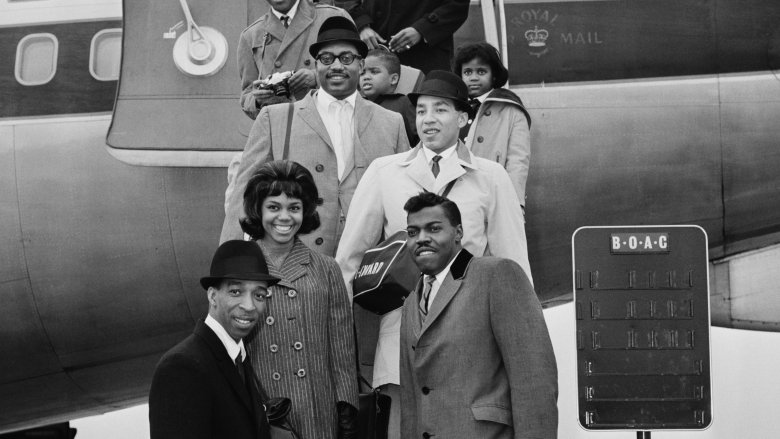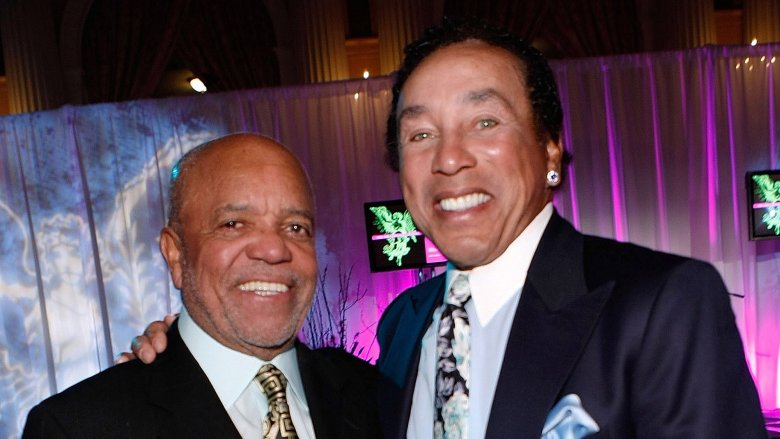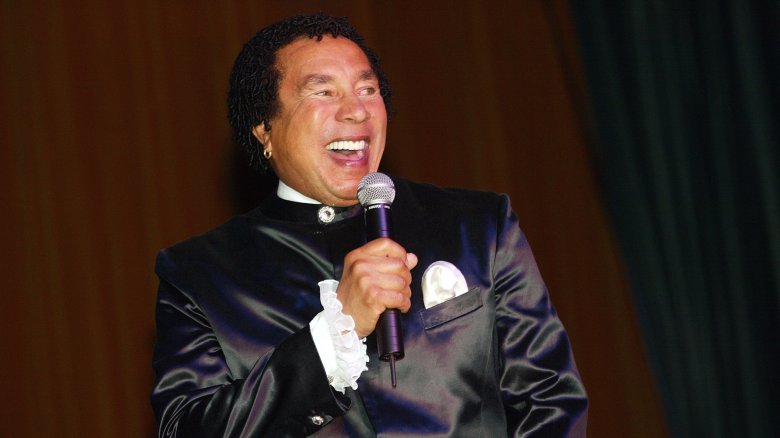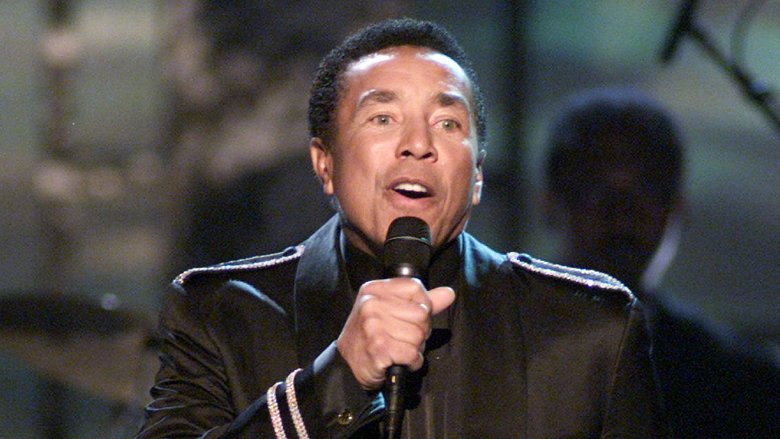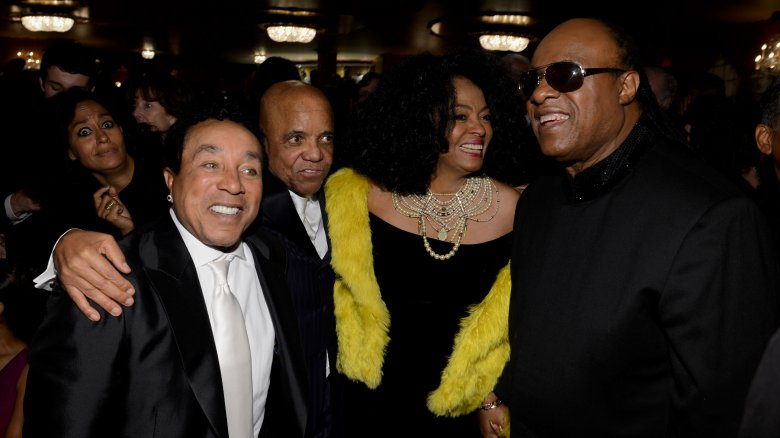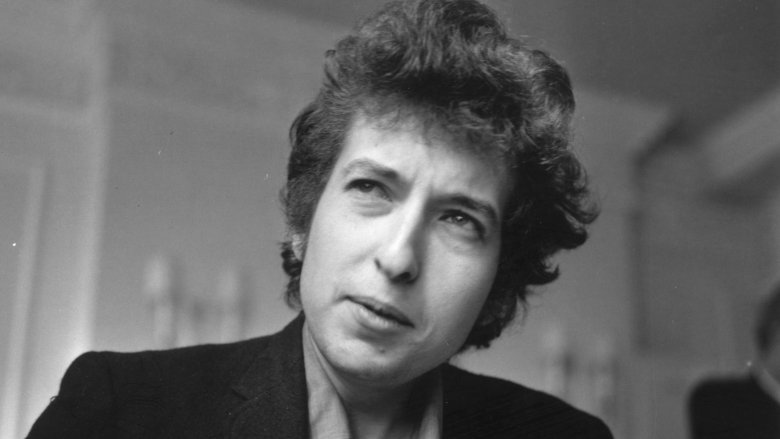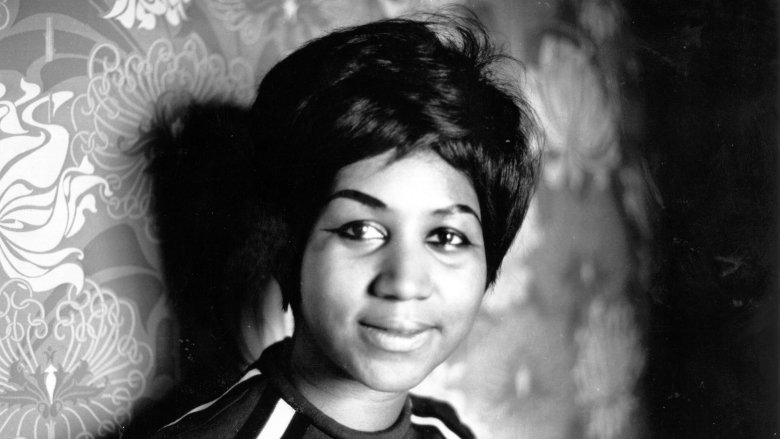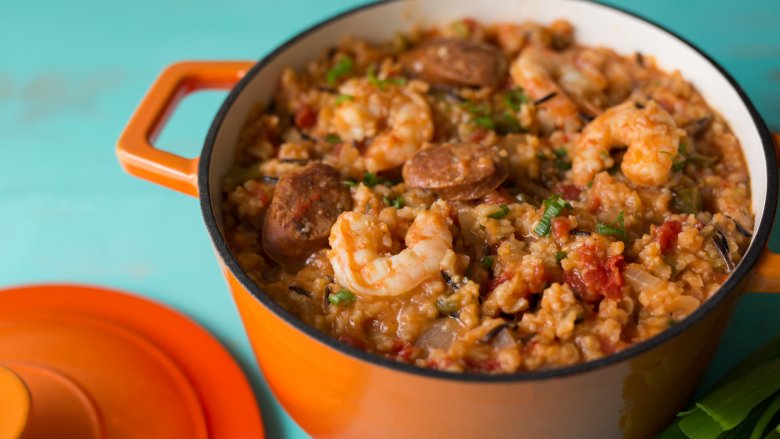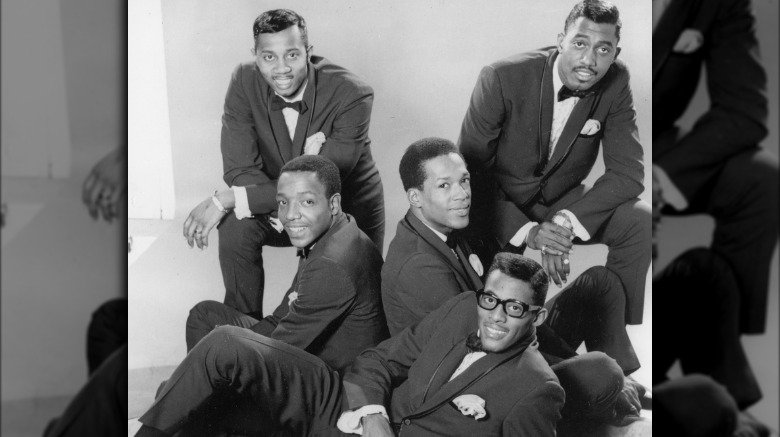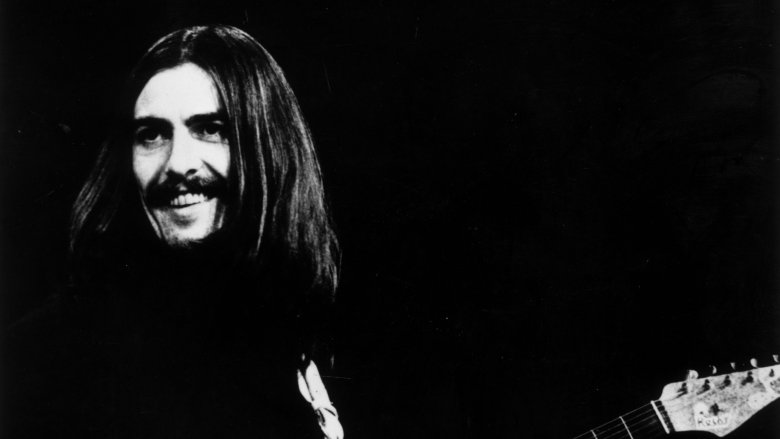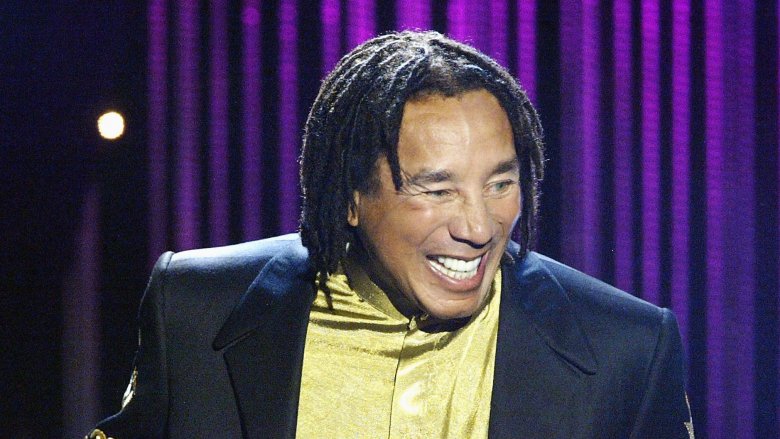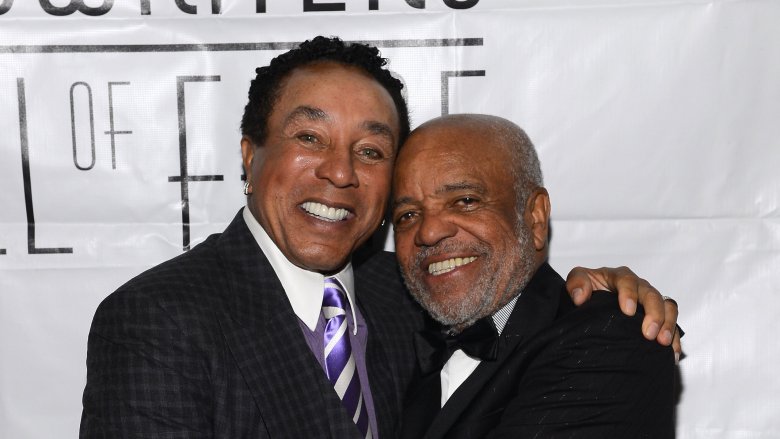The Untold Truth Of Smokey Robinson
Smokey Robinson is practically synonymous with the '60s heyday of Motown Records. As the frontman of the Miracles, his vocals led the way on many soul classics, and he also wrote plenty more for the label's other artists. Born in Detroit in 1940, Robinson formed a doo-wop group with some classmates in 1955. But shortly after graduating high school, he met a young songwriter named Berry Gordy, who saw promise in the youngster's material and took him under his wing. The band eventually became the Miracles. In 1959, Gordy founded Motown and signed his protege, and the hits started coming.
With the Miracles, Smokey placed 26 songs in the Top 40 of the pop chart between 1960 and 1972, including "I Second That Emotion," "Tears of a Clown," "Ooo Baby Baby," "The Tracks of My Tears," "Shop Around" and "You've Really Got a Hold on Me." Robinson then carried on his success as a solo act, with 10 Top 40 hits, such as "Cruisin'," "Being With You," and "One Heartbeat."
For his life's work, he's been inducted into both the Rock & Roll Hall of Fame and the Songwriter's Hall of Fame, and awarded the National Medal of Arts, the Kennedy Center Honors, and the Gershwin Prize for Popular Song. But there's a lot more to the history of Smokey Robinson, a true icon of American music.
He got his nickname from his uncle
William Robinson Jr. was named for his father, but the name by which the world would come to know him was given to him by a family member because of a shared love of the movies. "My uncle Claude was my favorite uncle," he told the Los Angeles Sentinel. "He was also my godfather. He and I were really, really close. He used to take me to see cowboy movies all the time when I was a little boy because I loved cowboy movies. He got a cowboy name for me, which was Smokey Joe. ... That's what everyone called me until I was about 12 and then I dropped the Joe part."
In the same interview, he was asked if Uncle Claude gave him the nickname to remind the fair-skinned William that he's black. His response: "I've heard that story about him giving it to me because I'm a light-skinned black man, but that's not true."
He met Motown founder Berry Gordy after failing an audition
The Five Chimes eventually morphed into the Matadors. In August 1957, they landed an audition with Brunswick Records, the home of Jackie Wilson. They failed the audition, but somebody in the room liked what he had heard. Smokey told CBN, "He stops us and says, 'Man, where'd you get those songs?' I said, 'I wrote 'em, man.' He said, 'You wrote all those songs?' We sang about five songs. I said, 'Yeah.' He said, 'A couple of 'em I liked.'"
He introduced himself as Berry Gordy, the man who co-wrote most of Wilson's early hits, including "Reet Petite" and "Lonely Teardrops." Robinson remembered, "He said, 'You got any more songs?' He never should've said that, man, because I had a loose-leaf notebook with about 100 songs in it. So I said, 'Yeah, man.' He said, 'I like your voice. Nobody sounds like you.'"
The two became friends and the Matadors changed their name to the Miracles. In early 1959, Gordy formed Tamla Records, which later became Motown, and made the Miracles one of his first signings.
If not for Motown, Smokey would have been an electrical engineer
Although he had been writing songs and singing with the Matadors while still in high school, Robinson had other plans for himself. He had originally thought about becoming a dentist, but, he told the Austin Chronicle, "when I got to be in the 12th grade we started dissecting stuff. I hated that."
Instead, he chose a different career path. "So I was taking electrical engineering prep courses for college," he continued. He decided to not enroll in college immediately so he could work full-time and save up money.
"I had a job from the time I was 10 years old. I did everything, delivering papers, shining shoes, worked at the grocery store around the corner and the drug store ... delivering telegrams on a bicycle after school." When he graduated high school, he was offered a full-time spot with telegram company Western Union: "Rather than going to school in September I just waited 'til January so I could save up money to buy books and clothes to go to college, and it just so happens that in August, I met Berry Gordy."
"Shop Around" was Motown's first million-seller
At that first meeting, Gordy sensed the potential in the youngster and gave him the benefit of his experience. Robinson told the Austin Chronicle the key to songwriting that Gordy told him. "You've got to make a song be one idea," he said. "You've got to make it be a short book or a short movie or a short story that has a beginning, a middle, and an ending that ties it together. And even if you don't have an ending, you've got to give people enough information so they can draw their own conclusion to what happened."
Smokey took that lesson to heart and it eventually paid off with "Shop Around," which he said he wrote in 30 minutes "at the most. It was one of those songs that just flowed out."
They cut it twice, first as a slow version, but when Gordy thought it needed something more, they recorded a faster version. The second take was released in October 1960 and it hit the Top 10 of the Billboard Hot 100 in early 1961, eventually peaking at No. 2, while topping the R&B chart. "Shop Around" became the first song for the fledgling label to sell more than 1 million copies. It was far from the last.
He discovered Diana Ross, but that was it
Smokey Robinson grew up at 581 Belmont Street in the North End neighborhood of Detroit, and a few doors down was the childhood home of another future Motown legend, Diana Ross. Her family eventually moved to the Brewster-Douglass housing projects, where she joined a group called the Primettes, who would later become the Supremes. She called upon her old friend to help her get a head start in the music business.
"I've known Diana since she was probably 8 years old," he said. "After Berry had started Motown — we'd been going for a couple of years — she was getting ready to graduate from high school and she called me. She said she had a group. She wanted me to hear them. I heard them. The rest is history."
Despite rumors to the contrary, Robinson has denied that they ever dated. "Diana Ross is my really good friend, okay?" he told Access in 2017. "... We're just close, and maybe, perhaps, it might have gotten misconstrued." In the same interview, he offered some information on her background that runs contrary to her glamorous image. "She was a tomboy, she was out there with the guys," he added. "She's very athletic."
Bob Dylan never called him "America's greatest living poet"
For years, it's been widely reported that Bob Dylan, who's credited with changing rock 'n' roll by adding the language of poetry, said that Smokey Robinson was "America's greatest living poet." But in 2011, former Motown publicist Al Abrams wrote in his book Hype & Soul: Behind the Scenes at Motown that he came up with the quote himself. As he recalled, Berry Gordy asked him to come up with a way to promote Robinson, and Abrams thought it would be a good idea to try to get the endorsement of Dylan. He asked Al Aronowitz, a music writer and friend of Dylan's, for assistance.
"Al said that he had heard Dylan praise some of Smokey's lyrics as being poetical," Abrams wrote, "I asked Al if he would let me get a quote from Dylan about Smokey. Al asked me what I had in mind and I suggested 'Smokey Robinson is America's Greatest Living Poet.' Al thought about it for a minute and said, 'Why bother even telling Bob? That sounds just like something he'd say anyway. Go ahead and do it. If Bob sees it in print he'll think he said it. He's certainly never going to deny it.'"
He was also lifelong friends with Aretha Franklin
When Aretha Franklin was 4 years old, her father, Reverend C.L. Franklin, moved his family from Buffalo to Detroit when he became the pastor at the New Bethel Baptist Church. A year or two later, Robinson, who was 8 years old, befriended her brother Cecil and was invited to the Franklin home, which was only a few miles away from Robinson's. He was impressed by their living conditions, but also by the young girl he met that day.
"I remember going over to see their house," he told Rolling Stone. "I had never been to a mansion before. That day, Aretha couldn't have been any more than 5 or 6 years old and she was singing a gospel song at the piano. From the time we were kids, man, Aretha could sing. She never changed. She was always Aretha."
Their friendship lasted until Aretha's death in August 2018. Speaking to AARP that November, he expressed regret that they had never recorded together. However, they sang a bit of Robinson's "Ooo Baby Baby" together on a 1979 episode of Soul Train. As soon as they started harmonizing, Franklin said, "We should have been a duo," to which Robinson replied, "I'm telling you. It's not too late."
Fans could shop around for his Cajun cooking
Even though he's from Detroit, Smokey Robinson launched his own line of Cajun/Creole frozen food in early 2004, selling microwaveable dishes of red beans & rice, gumbo and jambalaya. Speaking to the East Bay Times that year, Robinson, who stopped eating red meat in 1972, said that the chicken sausage and seafood gumbo was "a traditional family recipe with okra, all the vegetables ... and other good stuff added. It's sort of like health food gumbo. There's no red meat in it."
He added that the profits from the sales were "going to fund projects and forums and classes to teach young people the art of entrepreneurship. We don't think that the only thing they can do is be athletes and entertainers."
Within six months Robinson was sued by Louisiana chef Johnny Percle for trademark infringement on the grounds that Robinson's slogan, "The Soul Is in the Bowl," was too close to his own "Soul in Yo Bowl." The case was dismissed, but the company is no longer in business.
He wrote just so many Motown classics
In addition to writing hits for the Miracles, Robinson penned material for Motown's other acts, as did all of the label's writers. He gave hits to Mary Wells ("My Guy," "The One Who Really Loves You," "You Beat Me to the Punch"), Marvin Gaye ("I'll Be Doggone," "Ain't That Peculiar"), the Jackson 5 ("Who's Loving You"), the Temptations ("The Way You Do the Things You Do," "Get Ready"), and the Marvelettes ("The Hunter Gets Captured by the Game"), among others.
But there's one Smokey Robinson song that towers above all of them. After Wells topped the charts with his "My Guy," Robinson flipped the gender and came up with "My Girl," which he gave to the Temptations.
"I wrote 'My Girl' for David Ruffin's voice," Smokey said in 2015. "The Temptations were so creative in making up the background vocals. ... All the stuff that they're singing on 'My Girl,' they made that up themselves." But even though it's remembered as one of Motown's greatest recordings, Robinson has no problem with it being associated with another group instead of his own. "I always was so happy whenever I got a hit record on one of the artists," he added. "They were my brothers and sisters. If I could do something to enhance their career and make things better for them, that made me happy."
The whole world was listening
If there are any of Smokey Robinson's classics that you've never heard him sing, there's a good chance you're familiar with some of the many cover versions that he's inspired. Linda Ronstadt had a pair of hits, "Ooo Baby Baby" and "The Tracks of My Tears," the latter of which Johnny Rivers also placed in the Top 10 in 1967. His catalog has been mined for hits by acts as diverse as the Rolling Stones ("Going to a Go-Go"), Hall & Oates ("The Way You Do the Things You Do), Otis Redding ("My Girl"), Peter Tosh ("Don't Look Back"), and the Captain & Tennille ("Shop Around"). More recently, his solo hit "Cruisin'" topped the Billboard Adult Contemporary chart in 2000 when it was recorded by Gwyneth Paltrow and Huey Lewis for their karaoke-themed movie Duets.
And not only did the Beatles record "You've Really Got a Hold on Me," but George Harrison penned two tributes to Robinson. "Ooh Baby (You Know That I Love You)" appeared on 1975's Extra Texture and "Pure Smokey" arrived on Thirty-Three and 1/3 a year later.
"That was a wonderful, flattering thing for him to feel like that, and to write about it," Smokey told Something Else, "so that the world could know that he felt like that. It was wonderful to me, and I'm very flattered by that."
He spent much of the '80s addicted to cocaine
Smokey Robinson had managed to avoid hard drugs throughout the '60s and '70s. Although he often smoked marijuana, he didn't drink, both because he didn't like the taste of it and because he had seen the effects of alcoholism in his neighborhood when he was growing up, including within his own family. But after "Being With You" gave him another Top 5 hit in 1981, Robinson, at the age of 41, found himself addicted to cocaine.
"I thought that it couldn't happen to me," he told the Telegraph. "Because when I was younger I used to smoke a whole lot of weed. But weed was always manageable for me. ... But when I started dibbling and dabbling on the cocaine, that was a whole other animal. And I never thought I could become an addict. But I did."
In May 1986, a concerned friend took him to a small church in Los Angeles, where he said the pastor "told me that God had told her I was coming." She proceeded to tell him things that cocaine was doing to him that he hadn't spoken to anybody else about. "She told me every one of 'em that night. She said God had showed her what was going on," he added.
Robinson never touched cocaine again.
He was the soul of Motown
While Smokey Robinson is remembered as a recording artist, songwriter, and producer at Motown, he also helped shape the company's vision. In 1962, only three years after Berry Gordy (above) founded the label, he became its vice president, which added talent scout to his duties. He remained in the position until 1988, when Motown was sold to MCA. After 1990's Love, Smokey, he left for a new label, SBK, but returned for 1999's Intimate. As a tribute to all that Gordy had done for him, Robinson and his first wife, Claudette, who was a member of the Miracles, named their son Berry and their daughter Tamla.
And the good feelings are mutual. "He was the first," Gordy told Billboard in 2017. "My first artist at Motown, my first writer, my first producer, the one who wrote the company song that kept our mission in focus. That's why we called him the 'soul of Motown,' and he's still my best friend."

